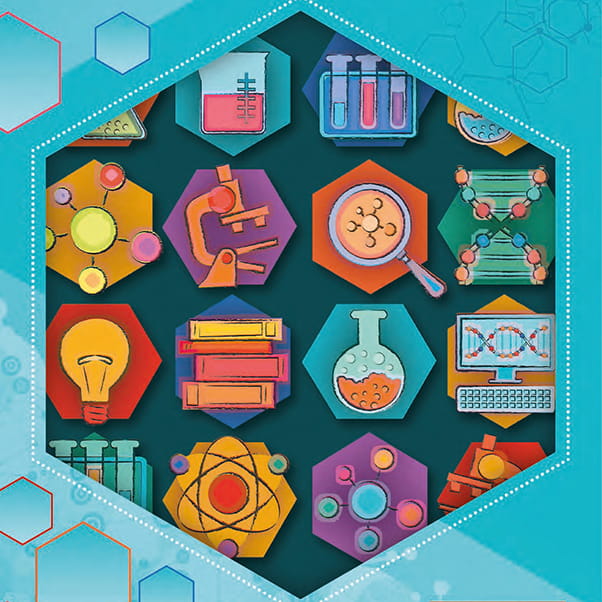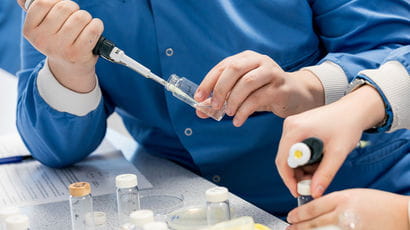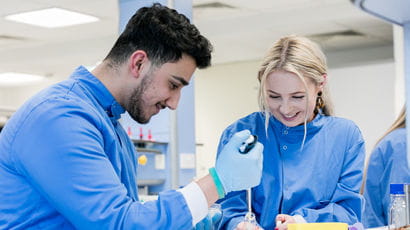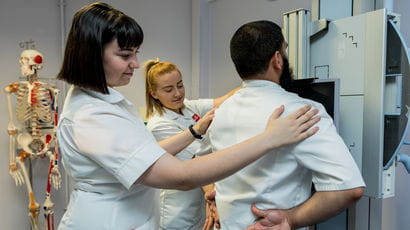Centre for Biomedical Research (CBR)
The Centre for Biomedical Research at UWE Bristol is a dynamic hub of scientific exploration dedicated to advancing our understanding of the biological, molecular, and technological mechanisms that underpin health, disease, and therapeutic innovation for the benefit of society.
Situated at the forefront of modern biomedical research, this Centre brings together a diverse community of scholars, scientists, and students, all driven by a shared passion for new knowledge and solutions. With a multidisciplinary approach, the Centre tackles a wide array of topics, from molecular genetics to diagnostic development, and applies this knowledge to address pressing global challenges including major chronic diseases and improved health management. By fostering collaboration and innovation, the Centre for Biomedical Research is instrumental in shaping the future of biomedicine and its profound impact on society.
The Centre has a broad biomedical research remit which is reflected in its three major thematic clusters:
- Human Health and Disease
- Biosensing, Analytical and Diagnostics
- Workforce and Practice Development

About us
More about CBR including its purpose, structure and operations.
Research themes
Find out more about the thematic clusters within CBR and its members.
Research projects
Research projects undertaken by CBR members.
Research with Impact
Highlights of research projects that are already making a difference to society.
Events
Find out more about CBR's latest events.
Publications
A list of the most recent publications produced by CBR members.
Contact us
For all scientific enquiries.
Centre for Biomedical Research blog
-

The UWE Centre for Biomedical Research (CBR) held its second annual conference on the 8th of September. A year after the establishment of the new centre, the theme of the meeting was to emphasise and build on our connections with our academic and industrial collaborators. The one day event again served to highlight the world-leading … Continue reading "Centre for Biomedical Research Annual conference"
Centre for Biomedical Research Annual conference
-

Some of the world-leading research being conducted in the Centre for Biomedical Science has been highlighted alongside other research taking place with the School of Applied Science at UWE. This edition of the Science Matters magazine has been created by UWE’s Science Communication students and is wonderfully professional and informative and can be accessed here.
Centre for Biomedical Science research highlighted in Science Matters magazine
-

Dr. Lucy Crompton and Dr. Dan Turnham awarded Academy of Medical Sciences Springboard funding Sincere congratulations to Dr. Lucy Crompton and Dr. Dan Turnham who have both been awarded grants from the Academy of Medical Sciences through their Springboard scheme. The purpose of the Springboard programme is to offer support for biomedical researchers at the … Continue reading "Academy of Medical Sciences awards for our biomedical researchers"
Academy of Medical Sciences awards for our biomedical researchers
-

Dr. Tim Craig, Associate Professor of Neuroscience, talks to BBC Radio 4 Health and Science about the potential for Lion’s Mane extracts in the prevention or treatment of dementia As part of an episode of Inside Health on BBC Radio 4, BBC Health and Science Correspondent James Gallagher interviewed Dr Tim Craig, Associate Professor of … Continue reading "Neuroscience research highlighted on BBC R4"
Neuroscience research highlighted on BBC R4
-

Congratulations to (L-R): Dr. James Robson, Dr. Lili Ordonez, Dr. Piers Townsend and Dr. Liana Gynn. Four academic members of the Centre for Research in Biosciences have been awarded the Vice Chancellor Early Career Research (VCECR) award. Dr. James Robson‘s project is entitled “Investigating tumour associated microbial communities and their virulence genes in colonoscopy polyp … Continue reading "CBR academics receive Early Career Research awards"
CBR academics receive Early Career Research awards
-

The 88th GASG meeting was held on Thursday 20th June 2024 at The Mansion Hose, Bletchley Park. CRIB researchers were in attendance at the 88th meeting of the Gas Analysis and Sensing Group (GASG) which was held at Bletchley Park, home to Britain’s wartime code breaking endeavours. Prof. Norman Ratcliffe was on the organising committee … Continue reading "The Gas Analysis and Sensing Group hold Annual Meeting at Bletchley Park"
The Gas Analysis and Sensing Group hold Annual Meeting at Bletchley Park
-

Prof. John Hancock, Dr. Tim Craig and Ros Rouse discuss the impact that the pandemic has had on animals around the world While the COVID pandemic has had a devastating impact on humanity across the globe, less consideration was given to its impact on animal populations. Prof. John Hancock (Professor of Cell Signalling), and Dr. … Continue reading "New book explores the impact of the COVID pandemic on animals"
New book explores the impact of the COVID pandemic on animals
-

Picture: Tsz Yan Joyce Chan and Dr. Kevin Honeychurch Dr. Kevin Honeychurch, Senior Lecturer in Forensic Chemistry and member of the Centre for Biomedical Research and his student Tsz Yan Joyce Chan have published a novel method for measuring Levimasole adulteration in cocaine Levamisole is a drug that was previously approved for the treatment of … Continue reading "New method for detecting ‘flesh-eating’ contaminants in illegal drugs developed by CBR researchers"
New method for detecting ‘flesh-eating’ contaminants in illegal drugs developed by CBR researchers
Transforming tomorrow, today.
Our unique approach to research, innovation, skills, enterprise and just and ethical practices is driving societal improvements and transforming futures for the better.
RISEResearch Centres and Groups
Browse UWE Bristol's portfolio of research areas, expertise, staff and publications.
Centres and groupsYou may also be interested in

Research in the School of Applied Sciences
The School of Applied Sciences is active in many areas of research and has established research projects attracting funding from various bodies, both in the UK and abroad.

Postgraduate research study
Postgraduate research at UWE Bristol offers you the opportunity to contribute to our leading edge research and work alongside our international experts.

Health professional development
Explore our range of professional short courses in health. Find out about funded opportunities, industry-specific courses and bespoke training.

Knowledge Transfer Partnerships
If your business has a strategy for growth, we can help make your ambitions a reality with a Knowledge Transfer Partnership (KTP).
